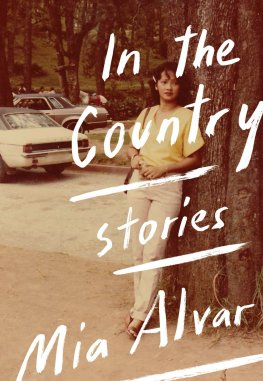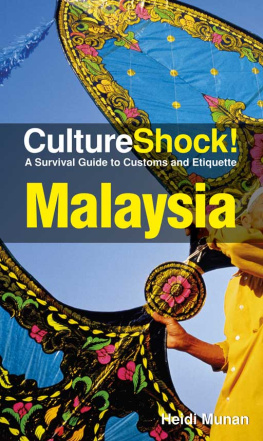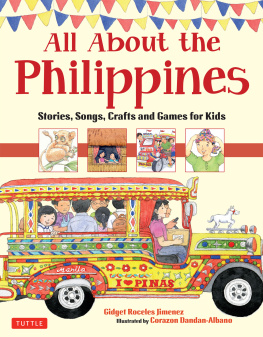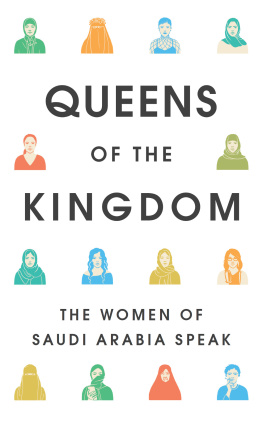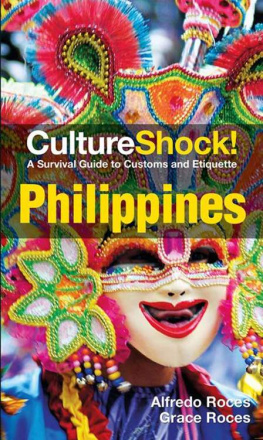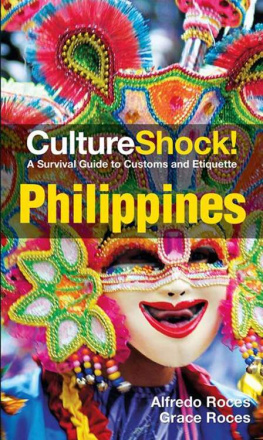Mia Alvar
In the Country: Stories
My mother was waiting in front of our house when I rode up in a taxi. There you are, she said, as if wed simply lost each other for an hour or two, at a party. I only half-embraced her, afraid she might break if I held too tight. She hadnt been able to collect me from the airport herself. Years ago my father had forbidden her to drive, though I supposed he could do little to prevent it now.
Let me, she said, reaching for my suitcase. I waved her away. I would no sooner allow my mother to carry my suitcase than allow her to carry me. Oh, Steve, she protested. You dont know my strength! She dropped her arms, flattening the palms against her lap, a habit I remembered well. Throughout my childhood she often looked to be drying her hands on an apron, whether or not she was wearing one.
In the decade since I left she hadnt aged, exactly. To my eyes she seemed not older but more. More frail; more tired; softer-spoken; her dark, teaspoon-shaped face cast farther down. Every feature I remembered had settled in her and been more deeply confirmed.
My parents still lived in Mabini Heights, a suburb of Manila and monument to a time when they belonged to the middle class. My father had called himself an import-export businessman before sliding, through the years, down a spiral of unrelated jobs, each more menial than the last, and harder for him to keep. And my mother had been a nurse before he banned her from working outside the house altogether. But if theyd come down in the world, so had Mabini Heights. Ever since my childhood in the seventies, when so much of that middle class fled Marcos and martial law, houses had been left unfinished or carved up for different uses. Squatters set up camp amid the scaffolding and roofless rooms. Families took in boarders or relatives. Our house had changed too: on its right, a gray unpainted cinder-block cell had been added, taking up what used to be a yard. My parents had cemented over the grass and built this sari-sari store five years earlier, selling snacks and other odds and ends through a sliding wicket to people on the street. The sari-sari compromised what I imagine was the dream of my parents, who grew up poor: a green buffer between the world and their world.
The addition seemed to shrink the main house to a toy, its windows tiny and its clay roof something storybook elves might have built. Next to it, I felt gigantic. I hunched my shoulders as I followed my mother inside. I was convinced, walking behind her, that the dishes on the shelves were rattling.
Papas in here, said my mother, opening the door to my old bedroom. The blast of cold came as a shock, then a relief. There was an air conditioner now, in the window under which I used to sleep as a child, and my old bed, where my father lay, was pushed into a corner. I saw, from the straw mat rolled up beside him, that my mother had been sleeping on the floor at night. Otherwise the room was clean and bare and quiet as I remembered same white cinder-block walls, same wood-tiled floors, same smell of mothballs from the same chest of drawers if all faded a little, like an old photograph. My mother kept a tidy house a trait we shared and things probably lasted longer in her care.
Two oxygen tanks stood beside my fathers bed. He breathed through a tube. The sight of him brought me back to New York, where I lived, and to the hospital where I worked as a clinical pharmacist. My father no longer resembled me. The short boxers physique, a bullish muscularity Id always detested sharing with him, was gone. In fact he no longer resembled anyone in the family; he belonged now to that transnational tribe of the sick and the dying. Without the dentures hed worn most of his adult life, my fathers mouth was a pit, a wrinkled open wound below the nose. What I could see of his eyes, under lids that were three-quarters closed, did not appear to see me back. He looked not only thin but vacuum-dried, desiccated less a human than the prehistoric remains of one.
He groaned, a low and heavy sound.
All right, Papa. All right. My mother took a brown dropper bottle from a chair next to the bed. This used to hold him for a while, she said. But lately hes complaining round the clock. Steadying his chin, she released a dose of liquid morphine into his mouth, with the dainty caution of a woman ladling hot soup or lighting a church candle. He let out another groan. Sshhh. She stroked the sides of his face. Even bedridden and in pain, my father had managed to preserve their old arrangement: when he called, she was there to wait on him.
Id predicted this, and how much I would hate to watch. In my suitcase, I carried an answer. Succorol was the newest therapy for chronic pain on the market in America. White and square, the size of movie ticket stubs, Succorol patches adhered to the skin, releasing opiates much stronger than morphine. Doctors had just started prescribing them to terminal patients in New York. Succorol could take years to reach the Philippines, a country whose premier pharmacy chain boasted LAGING BAGO ANG GAMOT DITO! as its tagline (We do not sell expired drugs here!). Still, something kept me from unpacking the patches right then. I did not want my mother to see my hands shaking to know what I had done to bring them here in the first place, let alone the price Id pay if anyone found out.
Is that better, Papa? My mother returned the morphine to the chair next to a rosary, a spiral notebook, a folded white hand fan. She logged the dose in to the notebook like the nurse shed once been. I picked up the fan and opened it, rib by wooden rib. Its lace edge had frayed, but the linen pleats remained bright and clean. I remembered sitting in her lap as a child during Sunday Mass, while she flicked her wrist back and forth to cool me with it.
Shed brought my father to the doctor eight months before, when he had trouble breathing and couldnt finish a meal without hunching over in pain. His belly had grown to the size of a watermelon and, from the veins straining against the skin, nearly as green. When my mother called me in New York and said liver cancer, I imagined my parents as clearly as if Id been sitting in the free clinic with them. I saw my father shrug or grunt each time the doctor addressed him, as proud and stubbornly tongue-tied as he always became around people with titles and offices. I saw my mother frown in concentration and move her lips in time with the doctors, as if that would help her understand. I saw her dab the corners of my fathers mouth with the white handkerchief she always carried in her purse.
Because of his age and his refusal, even after this diagnosis, to stop drinking, he never qualified for a transplant. At my mothers request, I wired money into a Philippine National Bank account that I kept open for the family. Whenever someone needed rent or medicine or tuition back home, I sent what I could, having no wife or children of my own to support. In my fathers case, I thought about refusing. But it occurred to me a relative might say he could get better care in America. His coming to New York for treatment and staying with me or, worse, in the hospital where I made my living was something Id have wired any sum to avoid.
When chemotherapy did not stop the cancers spread to his lungs, when radiation did not shrink the masses, my fathers doctor began to speak in a code we both understood: pain management instead of treatment; not recovery but comfort in his last days. My money turned from doxorubicin and radiotherapy to oxygen tanks, air-conditioning, the dark brown bottle of morphine. Still, I expected my father to survive. For all the years Id spent wishing him dead, it was my mothers role in the family drama, not his, to suffer.

